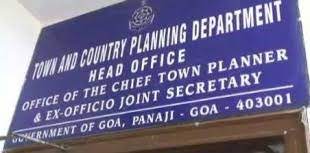The p'yat can express concerns or objections to specific projects, but it cannot decide zoning or land use matters contrary to TCP regulations

The Town and Country Planning (TCP) Department holds significant authority over zoning and land use decisions in Goa, including those within Panchayat jurisdictions. The regulatory framework under the Goa, Daman, and Diu Town and Country Planning Act, 1974 places the TCP in a dominant position for overseeing regional plans and issuing technical clearances for various projects. This centralisation of authority ensures uniformity but often limits the autonomy of Panchayats.
Permissions for construction projects, such as compound walls, require technical clearance from the TCP. Such clearances certify compliance with zoning regulations, development control norms, and regional plans, effectively subordinating Panchayat decisions to the TCP’s oversight.
Role of TCP department (SUBHEAD)
The TCP Department enforces adherence to state guidelines and regulations concerning land use and construction. Technical clearance by the TCP is mandatory for projects, ensuring conformity with the broader developmental goals outlined in the regional plan.
The TCP’s authority prevails over the Panchayat in zoning and land use matters. While Panchayats are empowered under the Goa Panchayat Raj Act, 1994 to oversee local development, their decisions must align with the TCP’s technical clearances. This precedence is legally binding unless successfully challenged through appropriate judicial channels.
Judicial precedents
Indian courts have consistently upheld the primacy of state planning authorities in zoning disputes. For instance, in Virendra Gaur v. State of Haryana (1995), the Supreme Court reinforced the state’s responsibility to regulate land use for sustainable development. Such rulings underscore the binding nature of the TCP’s decisions over local bodies like panchayats.
Implications for
panchayat of Macasana
The Panchayat can express concerns or objections to specific projects, but it cannot independently decide zoning or land use matters contrary to TCP regulations.
In cases of conflict, the TCP’s decisions are binding on the Panchayat unless legally challenged. This limits the Panchayat’s role to addressing procedural compliance and local concerns without contravening state-level planning guidelines.
Analysis of Clause 17 and Potential Objections by the Macasana Panchayat Clause 17 of the TCP’s Technical Clearance Order states: "The area under road widening shall be deemed to be the public road and shall not be enclosed/encroached."
This clause explicitly safeguards public access and prevents any enclosure or encroachment on the designated road widening area. The requirement for an affidavit or undertaking further ensures compliance with this condition.
Consistency across
technical clearances
If properties in the vicinity of Survey No. 29/3 have received technical clearances from the TCP containing similar conditions, the designation of the road widening area as a public road becomes a de facto uniform condition for all such properties.
This consistency highlights that all properties in the area are subject to identical planning and zoning restrictions, reinforcing the validity of the TCP’s clearance for Survey No. 29/3.
If other properties in the vicinity of Survey No. 29/3 have received similar clearances with the same Clause 17, the Panchayat is unlikely to have valid legal grounds to object to the regularisation of the compound wall for this property.
The TCP’s clearance takes precedence, and the Panchayat’s role is primarily to ensure compliance with local rules and procedural requirements.
Constitutional mandate
A principled explanation could focus on the Indian Constitution, which entrusts zoning and planning matters to state legislatures under Entry 18 of the State List in the Seventh Schedule. This grants states exclusive authority over land-use regulations, enabling departments like the TCP to oversee development uniformly. While Panchayats derive powers from the 73rd Amendment and Schedule XI, these powers are subject to state legislation. This constitutional framework ensures the TCP’s regulatory primacy over Panchayat decisions, fostering coherent regional planning.
Legal rights of current
owner of S. No. 29/3
The current owner has exclusive ownership rights over S. No. 29/3, including the right to exclude others from using their property. These rights are constitutionally protected and cannot be curtailed without lawful justification.
The occupant’s right to exclusive possession and unrestricted use of the affected portion of the property would be curtailed if any easementary claims were upheld.
Restricted utility
Easementary access would limit the utility of the property, reducing its economic value and potential for full cultivation or development. The imposition of such a right would permanently encumber the property.
If undocumented access is granted to the claimants as an easement, the occupant’s right to cultivate every square centimetre of S. No. 29/3 would be significantly restricted in the area of the easement.
This would limit the utility and economic value of the property, with permanent implications for current and future use. Safeguarding the owner’s exclusive rights over the land is essential to preserving the integrity and value of the property.